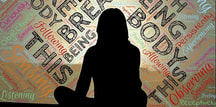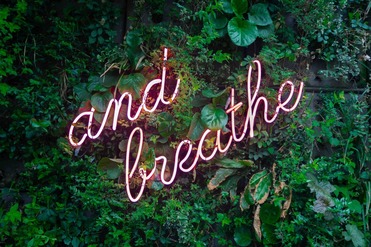
I discovered MBSR in an unusual way. It all began 6 years ago, when my work place, the counselling unit in a Sydney university, asked me to run some lunchtime meditations for students.
There was one hitch. I was to guide the meditation in a public space where students slept, hung out, and studied.
Weird heh? I knew that my voice would be needed to keep the space quiet, so I started looking for guided meditation practices.
Finally, I came across a series of recordings, led by Jon-Kabat Zinn, the founder of MBSR, that were just right. I began to read Jon’s books and enjoyed the wonderful integration of ideas from Buddhist contemplative practices, psychology and neuroscience.
I decided to try it out on myself and enrolled in an MBSR course.
Turning up, I found I was one of a group of about 20 of mixed ages and backgrounds.
We all chipped in saying what had brought us there. Some wanted to be more present in their relationships, with their children, or more able to leave work at work. Some were living with pain or illness. Others said their minds over worried about the past or the future, or had had experiences of depression or anxiety. There were a few experienced meditators there, who wanted to get back to a regular practice.
There were plenty of overlaps and we set off together on an 8-week journey.

The 8 stand-out attributes I identified in my 8-week course
1.The teacher knows their stuff
MBSR teachers have established meditation practices and professional accreditation. They know the practice from the inside out, and have a rich and textured understanding of what is likely to arise for participants and how to best support them. Some, like me, are experienced therapists.
2. There is enough time to build a habit.
Learning to meditate can be harder than expected. 8-weeks allows time to engage, fall off the wagon, struggle, question, discuss and find your feet.
MBSR classes offer a different quality of learning from the apps and shorter courses that abound.
3. MBSR is pragmatic.
I have done years of 10-day silent meditation retreats which I have loved. However, the MBSR course material allowed me to build a practice that I could integrate into my daily life in a more relevant way.
MBSR helps bring mindfulness to both the positive moments in life, enriching them and to the difficult.
4. The class is your support groupSharing the journey is invaluable. Thoughts like, ‘Why is my mind so busy? But I just can’t sit still? This is not working!’, are easier to bear when they are shared by all.
5. You'll come out with an understanding of how to bring mindfulness into 'your' life
You'll learn many meditation practices and discover what each can offer you and how you might continue when the course ends.
You will also learn informal mindfulness practices - non-meditation based practices that can be brought to many small moments in daily life.
6. The evidence-base is impressive
MBSR has been the subject of some of the most extensive and better quality mindfulness research. Try googling MBSR and…anything…depression, carers, HIV, happiness… You’re likely to find something.
In-course, you’ll be given science-based explanations - as best we have them- for understanding how the practices work and what they do and don’t do. It's fascinating.
7. It's fun and restorative
MBSR classes are interactive, experiential and stimulating. You’ll be engaged in stimulating exercises and rich discussions that elaborate on weekly themes…. making it all relevant to how we live our modern lives. I frequently hear students say, “that went quickly”
8. Many students say they learned things they didn’t expect.
I deepened my understanding of mindfulness. Mindfulness used to be more of a technique. Something I did when I was burnt out, a form of self-improvement. Mindfulness is now an act of relationship and friendship. It is a deep way of listening to myself and caring for myself. It is a way of moving through life.

Since doing my first course I have taught more than 20 public MBSR courses, taught mindfulness courses in schools, workplaces, to teenagers, parents and to university students.
My background as a counsellor/psychotherapist enriches my teaching. It allows me to better support the group. However, MBSR is not therapy, it’s an educational group. It can be a helpful addition to counselling or a completely stand-alone program. It's about building resilience in the capacity for self-care.
The 8-week course is fun, challenging, enlivening and stimulating. It is run in Marrickville, 4x a year, on a Tuesday. The next course begins Tuesday Feb 11 . Why not treat yourself to a course? I hope to see you there. Book before Feb 4 if possible to ensure a spot and assist in planning.
To find out more go www.headrest.com.au You can also call me if you have questions, leave a message if I don't pick up and I will get back to you 0431 842 950

 RSS Feed
RSS Feed
